Soldier’s Lost Love
In my last semester at Penn, I met the man I would marry two months later and stay married to for fifty-three years, until his sudden death four years ago. Mark Olds was thirteen years older than I was, so there was a big part of his life that I knew nothing about. He talked often about his military service during World War II, and forty years after the Battle of the Bulge, Mark felt an overpowering urge to retrace his footsteps as a US Army lieutenant in that campaign. After he promised me a week in Paris at the end of the trip, I cheerfully went along.
We rented a car and drove through French towns whose names Mark remembered but whose appearances he didn't recognize. He apologized for dragging me through one little burg after another, radically altered over the years by population shifts, changed economies and the inevitable modifications of time. Still, he yearned to go the last mile in this odyssey to the old medieval city of Luxembourg.
When we entered the city, it was as beautiful as he remembered. Well, almost. Towering office buildings had sprouted next to old townhouses. New concrete-balconied apartments swaggered over their older, smaller neighbors. Modern picture windows gleamed next to old leaded glass. But to me it still looked like a movie set, with towers and spires and crooked little streets.
In a polyglot of German, French, and English, Mark asked a gas-station attendant about Kirchberg, the farm village on the outskirts of town where he had stayed briefly so long ago.
"Kaput," the attendant said. "Gone. Taken over by the European Common Market Headquarters." He nodded toward the top of a hill where huge white structures had replaced the snowy fields and woods of the past.
Mark pointed our little car up a winding road leading in that direction, and after two hours of seeing nothing but housing developments, his disappointment was palpable. Then he excitedly pointed out a church spire. As he saw the smooth cobblestones in front of the doors of the old church, a memory flooded in. This was the place into which one hundred and fifty soldiers had crowded on that snowy Christmas Eve in 1944, having rumbled into town looking for high ground to use their special radio antennae to intercept and decode Nazi messages.
The Kirchbergers had cheered the Americans' entry into town, the children running out to clamber all over their jeeps and trucks. Mark's first job was to go from house to house, asking each village family to take in one of the American officers. He was supposed to house his company commander first, but when a pretty young blonde opened the first door he knocked on, he decided to stay there himself.
Leonie Schwartz had skin like alabaster and a smile that would break any soldier's heart, as Mark remembered it. She was twenty-three, the eldest of three lovely sisters and the same age as Mark. Her father welcomed the young lieutenant and invited him to stay—taking care to let Mark know that he knew a thing or two about soldiers. That night he extracted a promise to respect his house and daughters: Leonie, dark and giggling Maria, and gawky, shy Anneliese.
"You have the word of an American officer," Mark had told him solemnly.
The patriarch helped Mark keep his promise by locating him in such a way that, to reach the girls' room, he would have had to walk over their father's bed.
During the three weeks Mark stayed with the Schwartzes, he did keep his promise. He took Leonie for walks, for rides in his jeep, and to one dance. They kissed once – a sweet prim kiss – the night before he shipped out.
After Mark's return to the States, he wrote to Leonie, but he never received a reply. Over the years, he occasionally looked at his photos of the Schwartz family, but life took over – a career in radio, and me and our three daughters – and Leonie faded to a sweet memory.
Now, here we were on the street of that memory. Mark approached an elderly couple and asked about the Schwartzes. The old man shook his head. "Morts. Tous les deux." Both dead. Then he pointed down the street. "But the daughter, she married Gaston Schloesser," he added. "They live in that house with the red roof."
In the back of the house with the red roof, a tall woman in a cotton sundress was hanging clothes. "Pardon!" Mark called. "Is this the Schloesser house?"
She turned, looked at my still-handsome sixty-three-year-old husband for a long moment, and then cried out in French, "Mark! Is it really you, Mark?" Her smile was like the one that had enchanted the young lieutenant forty years before—but it didn't belong to Leonie. This was the nineteen-year-old he had scarcely noticed back then. Maria came running up to us, laughing and talking in rapid-fire French.
"How lucky that you came today!" She embraced us both and led us inside. "We are leaving tomorrow to visit our son."
"Gaston!" Maria called. When her husband learned who we were, he pumped our hands and brought out a bottle of champagne. By Gallic clocks, it's never too early to toast old friends. Maria phoned Leonie, who invited us to come later to see her and her husband, Lucien. Sadly, their youngest sister, Anneliese, had died young of cancer.
Maria apologized profusely for our "simple" lunch: white asparagus, curly parsley and tiny potatoes from her garden, quiche and cherry pie from the freezer, and Alsatian wine from the cellar. And then we met Leonie, who greeted us with the same sweet smile that had set all this in motion so long ago.
We drank more champagne and caught up with each other's lives. We accepted Lucien's invitation to stay the night, and we all remarked on how comfortable we felt with one another—especially noteworthy since, when Mark had been the Schwartzes' guest, Lucien was fighting for the German army.
The next morning, I told my husband how chills had run up and down my back when Maria had first cried out his name.
"She must have been in love with you to have remembered you so well after all those years," I said. And I told him what Leonie had said to me: "It's a pity you don't live in Europe. We could all be such good friends."
Yes, we could have. And we tried. The following year we hosted Leonie's and Lucien's son on his visit to New York. And we stayed in touch with the family for a few years, sending occasional notes and Christmas cards. But then they dwindled away and we lost touch.
Now Mark is gone and I don't know whether the Schwartz daughters are dead or alive. For a brief moment, we had bridged time and geography to recapture an important, albeit brief, relationship in my husband's life. I felt that I knew him better, having glimpsed who he had been so many years before.



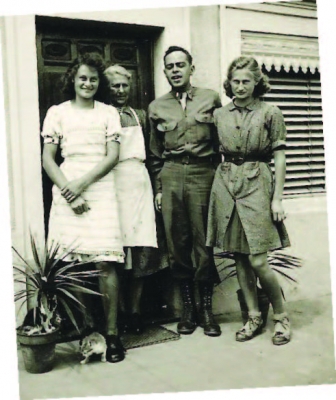
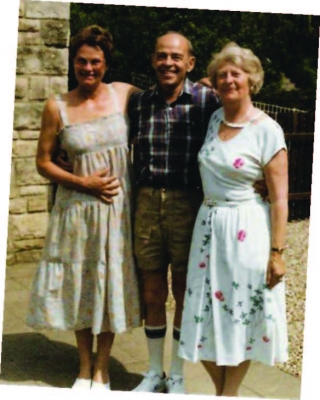
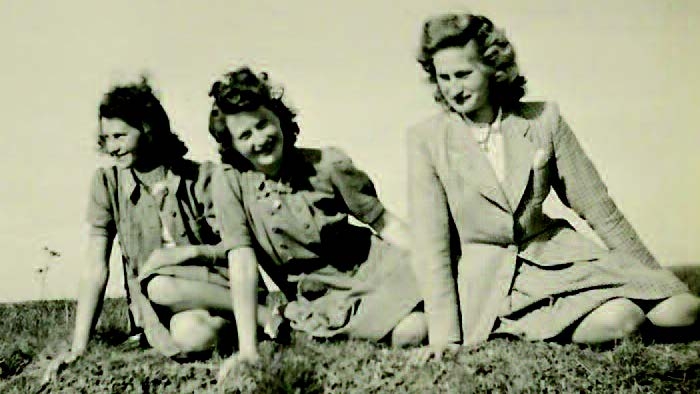
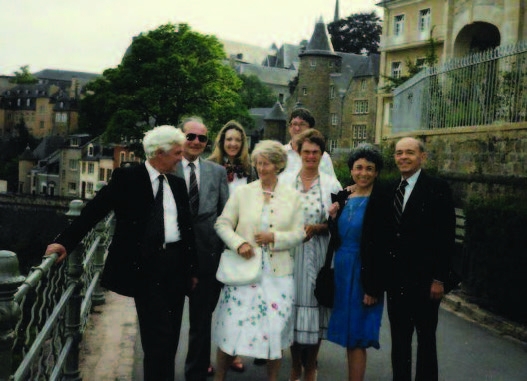
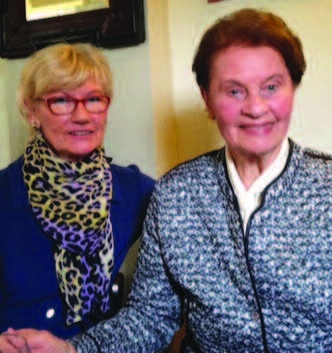




Comments